The adoption of advanced solar energy storage systems is transforming the efficiency and reliability of solar power, addressing its inherent variability due to daylight conditions. Innovations in battery technology like lithium-ion and flow batteries are at the core of this transformation, enhancing electricity management by storing excess solar energy during peak production times for later use. This not only reduces energy waste but also lessens reliance on non-renewable energy sources. As these technologies evolve, they're becoming more cost-effective and sustainable, with research focusing on alternatives like sodium-ion batteries. These advancements are crucial for managing the intermittency of solar power, ensuring a stable supply that can be integrated into various energy systems. The ongoing evolution of these storage solutions is essential for the broader adoption of solar power, contributing to our transition towards a sustainable and cleaner energy future. Keywords: Solar Energy Storage Solutions, Lithium-Ion Batteries, Sustainable Energy Technologies, Renewable Energy Storage, Solar Power Efficiency.
Solar energy represents a pivotal shift towards sustainable power sources, offering a clean and abundant alternative to fossil fuels. Central to harnessing solar energy’s full potential is effective storage—a critical component that addresses the intermittent nature of sunlight availability. This article delves into the transformative role of storage in optimizing solar energy use, showcasing advancements in battery technology and comparing top solar storage options like lithium-ion and flow batteries. It also explores strategic solar energy storage solutions tailored for homes to maximize energy utilization. As we look ahead, innovations and trends in solar energy storage are set to revolutionize the industry, ensuring a brighter, more energy-independent future.
- Understanding the Role of Storage in Solar Energy Systems
- Advancements in Solar Battery Technology for Efficient Energy Use
- Lithium-Ion vs. Flow Batteries: Comparing Solar Energy Storage Options
- Strategic Solar Energy Storage Solutions for Maximizing Home Energy Use
- The Future of Solar Energy Storage: Innovations and Trends to Watch
Understanding the Role of Storage in Solar Energy Systems
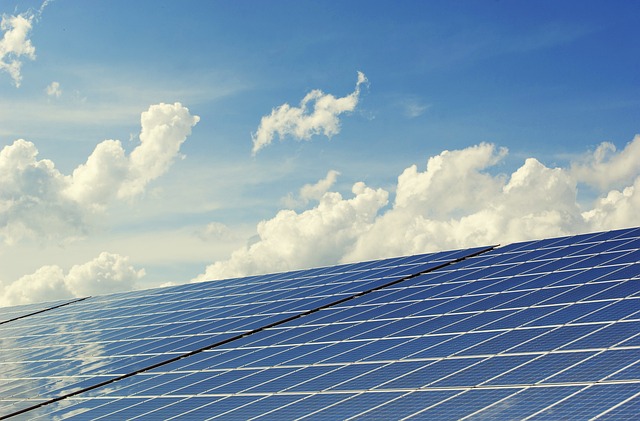
The integration of solar energy storage solutions is pivotal in optimizing the efficiency and reliability of solar power systems. Unlike the intermittent nature of solar energy generation, which depends on daylight hours and weather conditions, effective storage systems enable the capture and preservation of this renewable resource for use when sunlight is not available. This capacity to store excess solar energy generated during peak production times ensures a consistent energy supply, minimizing waste and reducing dependency on fossil fuels. Advanced battery technologies, such as lithium-ion and flow batteries, play a central role in these systems by providing the necessary storage capabilities. They allow for the management of electricity flows, facilitating the distribution of stored power during periods of high demand or low solar irradiance. This not only enhances the economic viability of solar energy installations but also supports grid stability and resilience as more renewable sources are integrated into our energy mix. The sophistication and capacity of these storage systems will continue to evolve, driving the expansion of solar energy’s potential and its integration into sustainable energy portfolios globally. Investing in robust storage solutions is a strategic move for both individuals and utility providers aiming to maximize the use of solar energy and contribute to a greener, more sustainable future.
Advancements in Solar Battery Technology for Efficient Energy Use
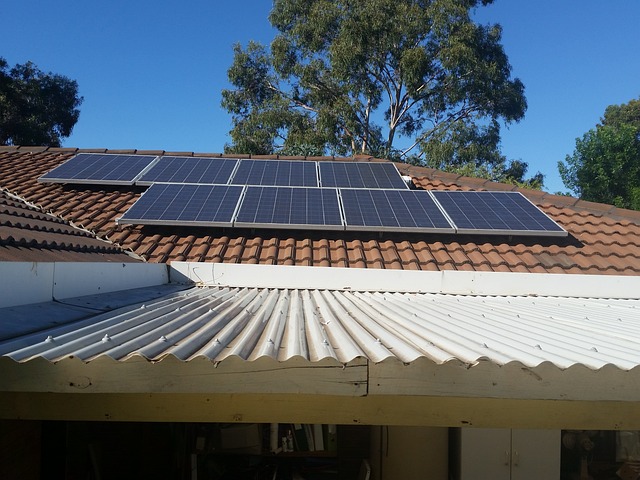
Solar energy storage solutions have made significant strides, with advancements in solar battery technology playing a pivotal role in maximizing energy efficiency. The evolution of lithium-ion batteries has been a game-changer, offering higher energy densities and longer lifespans. These improvements not only enhance the capacity to store solar power but also ensure its efficient utilization when required. Moreover, the research and development landscape are actively exploring alternative chemistries, such as sodium-ion and flow batteries, which promise to provide cost-effective, sustainable options with greater environmental impact considerations. These innovations are pivotal in addressing the intermittent nature of solar energy, enabling a more consistent and reliable power supply that can be seamlessly integrated into both residential and commercial energy systems. The pursuit of high-performance solar batteries is crucial for the widespread adoption of solar energy as a primary energy source, ensuring that excess solar energy generated during peak production hours can be effectively stored and used during periods of low sunlight or at night. As these technologies continue to advance, they will undoubtedly shape the future of renewable energy storage, making it a more integral component in our transition towards a sustainable energy economy.
Lithium-Ion vs. Flow Batteries: Comparing Solar Energy Storage Options
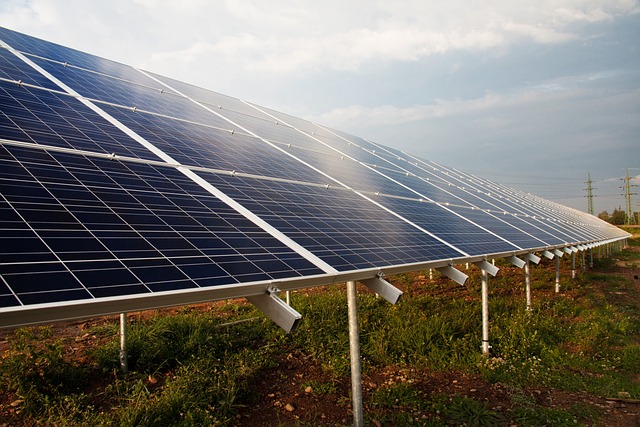
Solar energy storage solutions play a pivotal role in harnessing and maximizing the use of solar power, which is intermittent by nature. Among the various storage options available, Lithium-Ion (Li-ion) and Flow batteries stand out as two of the most prominent technologies. Li-ion batteries are known for their high energy density, long cycle life, and compact size, making them suitable for residential and commercial applications where space is at a premium. These batteries operate by using lithium ions moving between the anode and cathode during charge and discharge cycles, which allows for efficient energy storage and release.
On the other hand, Flow batteries, such as Vanadium Redox Flow (VRF) batteries, store energy in two electrolyte solutions that are pumped through separate tanks. This technology excels in large-scale energy storage due to its scalability; the system’s capacity can be expanded by adding more tanks. Flow batteries are particularly advantageous for utility-scale solar projects as they offer longer cycle life and easier scaling compared to Li-ion batteries. They also provide a higher level of safety as the electrolyte is less reactive than the materials in Li-ion cells. Additionally, Flow batteries can be fully discharged without harm, which makes them ideal for applications where energy demand may fluctuate significantly. In conclusion, both Lithium-Ion and Flow battery technologies offer distinct benefits tailored to different solar energy storage needs, and their selection should be based on the specific requirements of the application and the scalability, safety, and longevity considerations.
Strategic Solar Energy Storage Solutions for Maximizing Home Energy Use
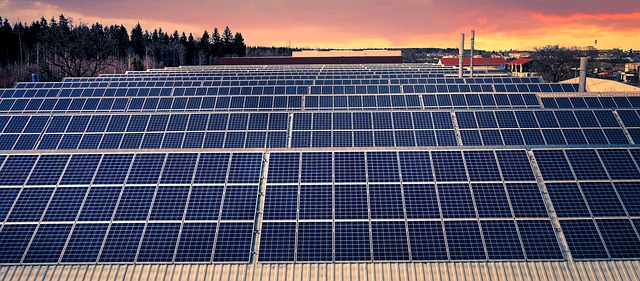
As the world increasingly turns towards renewable energy sources, solar energy stands out as a pivotal player in sustainable power generation. Strategic solar energy storage solutions are critical for maximizing home energy use, ensuring that households can harness the sun’s energy effectively even when sunlight is not available. Advanced battery technologies, such as lithium-ion and flow batteries, play a significant role in storing excess solar energy generated during peak daylight hours. These systems allow homeowners to access their stored power during evening or nighttime hours, mitigating the intermittent nature of solar energy and promoting consistent electricity supply. Additionally, smart energy management systems can optimize storage capacity by predicting usage patterns and solar production, further enhancing the efficiency of solar energy utilization within homes. By integrating these technologies, homeowners can significantly reduce their reliance on traditional power grids and contribute to a more sustainable future. The integration of weather forecasting capabilities with storage systems also contributes to better energy management decisions, anticipating periods of high solar generation or low demand, thus ensuring the maximization of stored energy use and minimizing waste. As such, strategic solar energy storage solutions are not just about storing energy but also about smartly managing it to align with household needs and solar availability, making them indispensable for those looking to transition towards a greener lifestyle.
The Future of Solar Energy Storage: Innovations and Trends to Watch
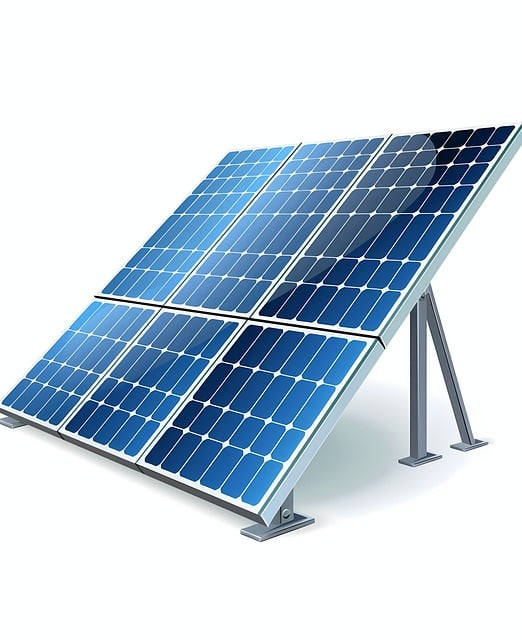
The landscape of solar energy storage is undergoing a significant transformation, driven by technological advancements and growing demand for sustainable energy solutions. Innovations in battery technology, such as lithium-ion and emerging alternatives like flow batteries, are enhancing energy density, lifespan, and safety. These improvements are pivotal in accommodating the intermittent nature of solar power, enabling a consistent and reliable energy supply that can meet peak demand. Solar energy storage systems are becoming more sophisticated, with smart grid integrations that optimize energy distribution and predictive analytics that anticipate solar output fluctuations based on weather patterns. This is crucial for maximizing the efficiency of solar energy utilization and reducing the reliance on fossil fuels.
Furthermore, the integration of artificial intelligence (AI) and machine learning in solar storage systems is set to revolutionize their performance. AI-driven algorithms are expected to dynamically manage energy flows, forecasting both supply and demand with remarkable accuracy. This predictive capability will not only enhance grid stability but also allow for more effective management of resources, minimizing waste and ensuring that stored solar energy is used optimally. The future of solar energy storage is one where these innovations converge to create a smarter, more resilient, and more sustainable energy ecosystem. As such, stakeholders in the energy sector are closely monitoring these trends, recognizing the potential for significant strides in harnessing and storing solar power effectively.
In conclusion, the integration of robust solar energy storage solutions is pivotal in harnessing the full potential of solar power for domestic and industrial applications. The advancements in battery technology, particularly the comparison between lithium-ion and flow batteries, offer clear pathways to maximize energy use. Strategic deployment of these systems within homes can significantly enhance self-sufficiency and reduce reliance on traditional grids. As we look ahead, the innovations and trends shaping the future of solar energy storage promise even greater efficiency and capacity, ensuring a sustainable and reliable energy supply for generations to come. The trajectory of solar energy, coupled with these storage advancements, is clear: it’s a promising and bright horizon for clean, renewable energy.
